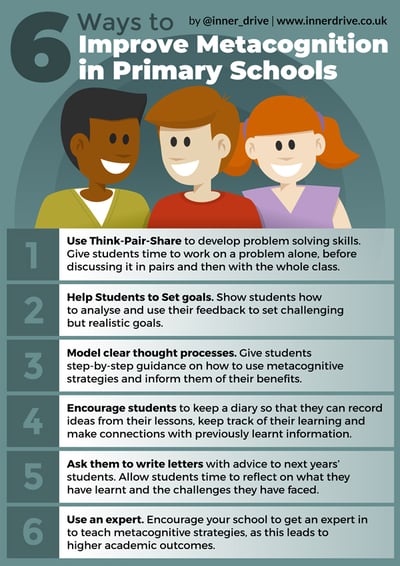
Metacognition refers to a student’s ability to show awareness, reflect and direct their thought process effectively towards their learning. As the concept of metacognition grows in popularity and the research surrounding it widens, primary school teachers have become increasingly interested in developing and improving these skills in their youngest students.
So, what strategies can they employ? How does one improve metacognition in primary-aged students?
THINK-PAIR-SHARE
Research has demonstrated that one effective way to develop metacognitive skills in primary school students is to enhance their problem-solving abilities using the Think-Pair-Share method.
When using this method, students are presented with a problem, before being given some time to work alone to try and come up with an appropriate answer. Students are then encouraged to partner up and discuss their answer, prior to a whole class discussion guided by the teacher.
GOAL-SETTING
Another way in which primary school children can improve their metacognitive skills is through goal-setting. In primary schools, this is likely to involve analysing past work for feedback and work through a process that prompts them to set challenging but realistic goals. The aim here is to eventually scaffold back the support from the teacher, so that students will be able to use this strategy themselves.
MODEL CLEAR THOUGHT PROCESSES
Research has shown that primary school students are more likely to enhance their metacognitive skills if they are shown how the strategies can be used (e.g. step-by step guidance) and informed of the benefits.
Other research has shown that use of a computer programme that provides maths problems accompanied by a clear step-by-step structure (i.e. ’I read carefully, I make a plan, I check my answer, what did I learn?’) is effective in enhancing students’ metacognitive skills. This technique increases the likelihood that they solve the problem correctly and monitor their thought processes.
GET STUDENTS TO KEEP A LEARNING DIARY
One of the key metacognitive skills that primary school teachers should be looking to develop is self-monitoring, which can be improved by asking students to keep a diary. Keeping a diary is an effective method, as it allows students to record ideas from their lessons, meaning that they can keep track of their learning and connect knowledge obtained in one lesson with previous ideas and learning.
SELF-REFLECTION
Research has shown that primary school students’ metacognitive skills can be enhanced by encouraging them to reflect on their learning. One way in which this can be achieved is by asking students to write letters to next year’s students outlining what they will learn, some of the potential challenges they may face and any advice they have. Writing these letters should allow students to consider their personal development and the knowledge they have gained, whilst also improving their writing skills.
OUTSIDE INVOLVEMENT
Recent research demonstrated that metacognitive interventions are more effective and lead to higher academic outcomes if they are directed by researchers rather than teachers. However, if teachers have to implement metacognitive programmes themselves, some of the above strategies should help.
FINAL THOUGHT
Research has shown that, with the implementation of the correct strategies and practice, teachers can develop and improve metacognitive skills amongst primary students. Being able to implement and learn such skills at an early age can only be a positive thing, as it will allow these students to reap the benefits both inside and outside the classroom for a long period of time.
Sumber : https://www.innerdrive.co.uk

No comments:
Post a Comment